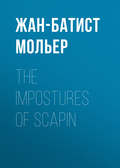
Мольер (Жан-Батист Поклен)
The School for Husbands
SGAN. Oh, how sweet he is! All sugar and honey!
AR. At all events, that is my disposition; and I thank Heaven for it. I would never lay down these strict rules which make children wish their parents dead.
SGAN. But the liberty acquired in youth is not so easily withdrawn later on; all those feelings will please you but little when you have to change her mode of life.
AR. And why change it?
SGAN. Why?
AR. Yes.
SGAN. I do not know.
AR. Is there anything in it that offends honour?
SGAN. Why, if you marry her, she may demand the same freedom which she enjoyed as a girl?
AR. Why not?
SGAN. And you so far agree with her as to let her have patches and ribbons?
AR. Doubtless.
SGAN. To let her gad about madly at every ball and public assembly?
AR. Yes, certainly.
SGAN. And the beaux will visit at your house?
AR. What then?
SGAN. Who will junket and give entertainments?
AR. With all my heart.
SGAN. And your wife is to listen to their fine speeches?
AR. Exactly.
SGAN. And you will look on at these gallant visitors with a show of indifference?
AR. Of course.
SGAN. Go on, you old idiot. (To Isabella). Get indoors, and hear no more of this shameful doctrine.
SCENE III. – ARISTE, SGANARELLE, LÉONOR, LISETTE
AR. I mean to trust to the faithfulness of my wife, and intend always to live as I have lived.
SGAN. How pleased I shall be to see him victimized!
AR. I cannot say what fate has in store for me; but as for you, I know that if you fail to be so, it is no fault of yours, for you are doing everything to bring it about.
SGAN. Laugh on, giggler! Oh, what a joke it is to see a railer of nearly sixty!
LEO. I promise to preserve him against the fate you speak of, if he is to receive my vows at the altar. He may rest secure; but I can tell you I would pass my word for nothing if I were your wife.
LIS. We have a conscience for those who rely on us; but it is delightful, really, to cheat such folks as you.
SGAN. Hush, you cursed ill-bred tongue!
AR. Brother, you drew these silly words on yourself. Good bye. Alter your temper, and be warned that to shut up a wife is a bad plan. Your servant.
SGAN. I am not yours.
SCENE IV. – SGANARELLE, alone
Oh, they are all well suited to one another! What an admirable family. A foolish old man with a worn-out body who plays the fop; a girl-mistress and a thorough coquette; impudent servants; – no, wisdom itself could not succeed, but would exhaust sense and reason, trying to amend a household like this. By such associations, Isabella might lose those principles of honour which she learned amongst us; to prevent it, I shall presently send her back again to my cabbages and turkeys.
SCENE V. – VALÈRE, SGANARELLE, ERGASTE
VAL. (Behind). Ergaste, that is he, the Argus whom I hate, the stern guardian of her whom I adore.
SGAN. (Thinking himself alone). In short, is there not something wonderful in the corruption of manners now-a-days?
VAL. I should like to address him, if I can get a chance, and try to strike up an acquaintance with him.
SGAN. (Thinking himself alone). Instead of seeing that severity prevail which so admirably formed virtue in other days, uncontrolled and imperious youth here-about assumes… (Valère bows to Sganarelle from a distance).
VAL. He does not see that we bow to him.
ERG. Perhaps his blind eye is on this side. Let us cross to the right.
SGAN. I must go away from this place. Life in town only produces in me…
VAL. (Gradually approaching). I must try to get an introduction.
SGAN. (Hearing a noise). Ha! I thought some one spoke… (Thinking himself alone). In the country, thank Heaven, the fashionable follies do not offend my eyes.
ERG. (To Valère). Speak to him.
SGAN. What is it?.. my ears tingle… There, all the recreations of our girls are but… (He perceives Valère bowing to him). Do you bow to me?
ERG. (To Valère). Go up to him.
SGAN. (Not attending to Valère). Thither no coxcomb comes. (Valère again bows to him). What the deuce!.. (He turns and sees Ergaste bowing on the other side). Another? What a great many bows!
VAL. Sir, my accosting you disturbs you, I fear?
SGAN. That may be.
VAL. But yet the honour of your acquaintance is so great a happiness, so exquisite a pleasure, that I had a great desire to pay my respects to you.
SGAN. Well.
VAL. And to come and assure you, without any deceit, that I am wholly at your service.
SGAN. I believe it.
VAL. I have the advantage of being one of your neighbours, for which I thank my lucky fate.
SGAN. That is all right.
VAL. But, sir. do you know the news going the round at Court, and thought to be reliable?
SGAN. What does it matter to me?
VAL. True; but we may sometimes be anxious to hear it? Shall you go and see the magnificent preparations for the birth of our Dauphin, sir?
[Footnote: The Dauphin, the son of Louis XIV. was born at Fontainebleau, on the 1st of November, 1661; The School for Husbands was first acted on the 24th of June of the same year; hence Molière ventures to prophesy about the Dauphin's birth.]
SGAN. If I feel inclined.
VAL. Confess that Paris affords us a hundred delightful pleasures which are not to be found elsewhere. The provinces are a desert in comparison. How do you pass your time?
SGAN. On my own business.
VAL. The mind demands relaxation, and occasionally gives way, by too close attention to serious occupations. What do you do in the evening before going to bed?
SGAN. What I please.
VAL. Doubtless no one could speak better. The answer is just, and it seems to be common sense to resolve never to do what does not please us. If I did not think you were too much occupied, I would drop in on you sometimes after supper.
SGAN. Your servant.
SCENE VI. – VALÈRE, ERGASTE
VAL. What do you think of that eccentric fool?
ERG. His answers are abrupt and his reception is churlish.
VAL. Ah! I am in a rage.
ERG. What for?
VAL. Why am I in a rage? To see her I love in the power of a savage, a watchful dragon, whose severity will not permit her to enjoy a single moment of liberty.
ERG. That is just what is in your favour. Your love ought to expect a great deal from these circumstances. Know, for your encouragement, that a woman watched is half-won, and that the gloomy ill-temper of husbands and fathers has always promoted the affairs of the gallant. I intrigue very little; for that is not one of my accomplishments. I do not pretend to be a gallant; but I have served a score of such sportsmen, who often used to tell me that it was their greatest delight to meet with churlish husbands, who never come home without scolding, – downright brutes, who, without rhyme or reason, criticise the conduct of their wives in everything, and, proudly assuming the authority of a husband, quarrel with them before the eyes of their admirers. "One knows," they would say, "how to take advantage of this. The lady's indignation at this kind of outrage, on the one hand, and the considerate compassion of the lover, on the other, afford an opportunity for pushing matters far enough." In a word, the surliness of Isabella's guardian is a circumstance sufficiently favourable for you.
VAL. But I could never find one moment to speak to her in the four months that I have ardently loved her.
ERG. Love quickens people's wits, though it has little effect on yours.
If I had been…
VAL. Why, what could you have done? For one never sees her without that brute; in the house there are neither maids nor men-servants whom I might influence to assist me by the alluring temptation of some reward.
ERG. Then she does not yet know that you love her?
VAL. It is a point on which I am not informed. Wherever the churl took this fair one, she always saw me like a shadow behind her; my looks daily tried to explain to her the violence of my love. My eyes have spoken much; but who can tell whether, after all, their language could be understood?
ERG. It is true that this language may sometimes prove obscure, if it have not writing or speech for its interpreter.
VAL. What am I to do to rid myself of this vast difficulty, and to learn whether the fair one has perceived that I love her? Tell me some means or other.
ERG. That is what we have to discover. Let us go in for a while – the better to think over it.
ACT II
SCENE I. – ISABELLA, SGANARELLE
SGAN. That will do; I know the house, and the person, simply from the description you have given me.
ISA. (Aside). Heaven, be propitious, and favour to-day the artful contrivance of an innocent love!
SGAN. Do you say they have told you that his name is Valère?
ISA. Yes.
SGAN. That will do; do not make yourself uneasy about it. Go inside, and leave me to act. I am going at once to talk to this young madcap.
ISA. (As she goes in). For a girl, I am planning a pretty bold scheme. But the unreasonable severity with which I am treated will be my excuse to every right mind.
SCENE II. – SGANARELLE, alone
(Knocks at the door of Valère's house). Let us lose no time; here it is. Who's there? Why, I am dreaming! Hulloa, I say! hulloa somebody! hulloa! I do not wonder, after this information, that he came up to me just now so meekly. But I must make haste, and teach this foolish aspirant…
SCENE III. – VALÈRE, SGANARELLE, ERGASTE
SGAN. (To Ergaste, who has come out hastily). A plague on the lubberly ox! Do you mean to knock me down – coming and sticking yourself in front of me like a post?
VAL. Sir, I regret…
SGAN. Ah! you are the man I want.
VAL. I, sir?
SGAN. You. Your name is Valère, is it not?
VAL. Yes.
SGAN. I am come to speak to you if you will allow me.
VAL. Can I have the happiness of rendering you any service?
SGAN. No; but I propose to do you a good turn. That is what brings me to your house.
VAL. To my house, sir!
SGAN. To your house. Need you be so much astonished?
VAL. I have good reason for it; I am delighted with the honour…
SGAN. Do not mention the honour, I beseech you.
VAL. Will you not come in?
SGAN. There is no need.
VAL. I pray you, enter.
SGAN. No, I will go no further.
VAL. As long as you stay there I cannot listen to you.
SGAN. I will not budge.
VAL. Well, I must yield. Quick, since this gentleman is resolved upon it, bring a chair.
SGAN. I am going to talk standing.
VAL. As if I could permit such a thing!
SGAN. What an intolerable delay!
VAL. Such incivility would be quite unpardonable.
SGAN. Nothing can be so rude as not to listen to people who wish to speak to us.
VAL. I obey you, then.
SGAN. You cannot do better. (They make many compliments about putting on their hats). So much ceremony is hardly necessary. Will you listen to me?
VAL. Undoubtedly, and most willingly.
SGAN. Tell me: do you know that I am guardian to a tolerably young and passably handsome girl who lives in this neighbourhood, and whose name is Isabella?
VAL. Yes.
SGAN. As you know it, I need not tell it to you. But do you know, likewise, that as I find her charming, I care for her otherwise than as a guardian, and that she is destined for the honour of being my wife?
VAL. No!
SGAN. I tell it you, then; and also that it is as well that your passion, if you please, should leave her in peace.
VAL. Who? – I, sir?
SGAN. Yes, you. Let us have no dissembling.
VAL. Who has told you that my heart is smitten by her?
SGAN. Those who are worthy of belief.
VAL. Be more explicit.
SGAN. She herself.
VAL. She!
SGAN. She. Is not that enough? Like a virtuous young girl, who has loved me from childhood, she told me all just now; moreover, she charged me to tell you, that, since she has everywhere been followed by you, her heart, which your pursuit greatly offends, has only too well understood the language of your eyes; that your secret desires are well known to her; and that to try more fully to explain a passion which is contrary to the affection she entertains for me, is to give yourself needless trouble.
VAL. She, you say, of her own accord, makes you…
SGAN. Yes, makes me come to you and give you this frank and plain message; also, that, having observed the violent love wherewith your soul is smitten, she would earlier have let you know what she thinks about you if, perplexed as she was, she could have found anyone to send this message by; but that at length she was painfully compelled to make use of me, in order to assure you, as I have told you, that her affection is denied to all save me; that you have been ogling her long enough; and that, if you have ever so little brains, you will carry your passion somewhere else. Farewell, till our next meeting. That is what I had to tell you.
VAL. (Aside). Ergaste, what say you to such an adventure?
SGAN. (Aside, retiring). See how he is taken aback!
ERG. (In a low tone to Valère). For my part, I think that there is nothing in it to displease you; that a rather subtle mystery is concealed under it; in short, that this message is not sent by one who desires to see the love end which she inspires in you.
SGAN. (Aside). He takes it as he ought.
VAL. (In a low tone to Ergaste). You think it a mystery…
ERG. Yes… But he is looking at us; let us get out of his sight.






